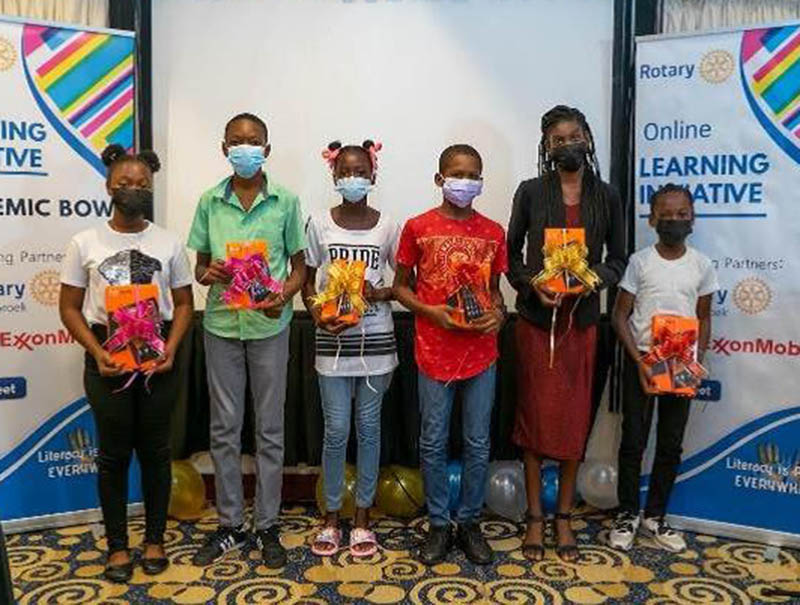The Rotary Club of Stabroek is collaborating with ExxonMobil Guyana and the BrainStreet Group to deliver interactive online education particularly in the hinterland communities, a release from the Club stated yesterday.
BrainStreet Group is a local ICT services firm founded in 1994 that offers a range of management information and business system consulting services for government and private sector agencies.
According to the release, this project follows a successful first-phase implemented in 2020 which saw online courses being developed and delivered for grades Three, Four, Five and Six subject categories to registered users on the BrainCentral platform. These were also broadcasts via Facebook Live to widen audience participation and awareness. The courses were specifically designed to address weak areas for students who preferred to study specific topics instead of entire subjects. Such topics include algebraic expressions, linear equations and inequations, simultaneous equations, factorisation, quadratic expressions and equations, and verbal statements and symbolic expressions.
The BrainCentral educational portal is an online environment that helps students study for exams. It allows participants to test and improve their skills via quizzes, lessons and live tutorials.
The first phase of this initiative, the release explained, was successful due to strategic partnerships that were formed with residents and community leaders who expressed a strong desire to assist the children in the various communities. One such example is a partnership with some of the residents in Sandvoort, Canje River, Berbice, where a small learning centre was established at the Sandvoort Primary School. The residents provided tablets to allow students in grades Five and Six to access courses on the BrainCentral platform via the e-Government network. This collaboration continues with the provision of academic support for the students throughout the school year. An online National Spelling Bee Competition which attracted over 100 registrants and culminated with exciting semifinal and final rounds also formed part of the phase one initiative.
The second phase of this project, it added, will build on the successes of phase one and will see the development of additional local community Wi-Fi networks to give the students access to academic materials on a localised version of BrainCentral. Teachers in the villages will also be trained to develop and deliver lessons via the local platform.
Villages such as Yupukari, Katoonarib and Paramakatoi in regions Eight and Nine, among others, are expected to benefit from this platform. A key feature of the application is that the courses can be downloaded on to a device. This means that students can access educational resources without needing continuous internet connectivity. Content delivered by the Ministry of Education can also be installed and accessed via the platform.
Work has also commenced on the development of online science laboratories. The concept is to develop animated lab experiments that would give students an interactive experience allowing for transfer of knowledge to help with their studies.
The creation of public learning spaces where school-aged children are able to access the BrainCentral learning platform from select public locations free of cost is also part of the activities to be completed under this phase. This, the release explained, will especially help students who are still struggling with reliable internet access but who will be able to visit the identified areas to access online teachers, submit assignments, and practice online quizzes as part of their continuous learning.
Another component of this project will be the hosting of an Academic Bowl for Grade Nine students. The main objectives of this competition are to foster the pursuit of excellence in a spirit of academic competition and good sportsmanship and encourage interaction between schools and the community. The subject areas for the competition are English, Mathematics, Social Studies, and Science. Preliminary rounds of the competition will be held online while the semi-finals and final rounds will be hosted live on television and livestreamed on social media. Prizes will be awarded to deserving competitors.
The Rotary Club of Stabroek and its collaborating partners, the BrainStreet Group and ExxonMobil Guyana are optimistic that the project will provide support to government’s initiatives in online education delivery and improved accessibility to educational content.
ExxonMobil Guyana Community Relations Manager, Suzanne DeAbreu, who was present at the launch on December 16 at the Herdmanston Lodge said that the expansion of the programme will help to excite and motivate young people and keep them engaged not only until they are able to return to school but in some instances, it will supplement their learning beyond. “I look forward to seeing the benefits of the programme and hope that it goes a long way in helping these youngsters pursue their futures.”
She opined that it is “strong partnerships” with NGOs like the Rotary Club of Stabroek that enables ExxonMobil Guyana to “fulfill our commitment to positively impact communities by making valued social investments with sustainable benefits. Providing educational opportunities that contribute to the socioeconomic advancement of young people demonstrates our dedication to making a difference for today’s students and generations to come.”
President of the Rotary Club of Stabroek, Carlotta Boodie, expressed similar sentiments and underscored the need for corporate entities to continue supporting organisations such as Rotary that has over the years, established strong community relationships. “The Rotary Club of Stabroek is extremely pleased to have this collaborative partnership with ExxonMobil and Brain Street Group that has helped us to expand our reach with regards to our Literacy Programmes. We embrace Nelson Mandela’s statement ‘Education is the most powerful weapon which you can use to change the world.’ This collaboration offers our children access to education in new and exciting ways.”
Six children from the Buxton Youth Developers, St Joseph High School, and the club’s Bagotville/Nismes/LaGrange literacy project were presented with computer tablets, the release added.






